Staring at a blank screen, wondering how to start your next blog post? We’ve all been there.
That’s why we’ve turned to artificial intelligence (AI) tools—they’ve made writing faster, easier, and more fun. Using AI with WordPress has helped us create engaging content while staying true to our voice.
Whether you’re just starting out or already publishing regularly, AI can speed up your process and keep your ideas flowing. It’s also great for improving your site’s content and reaching more readers.
In this guide, we’ll show you how to use AI tools inside WordPress to write better posts with less effort. You’ll learn how to simplify your workflow without losing your personal style.
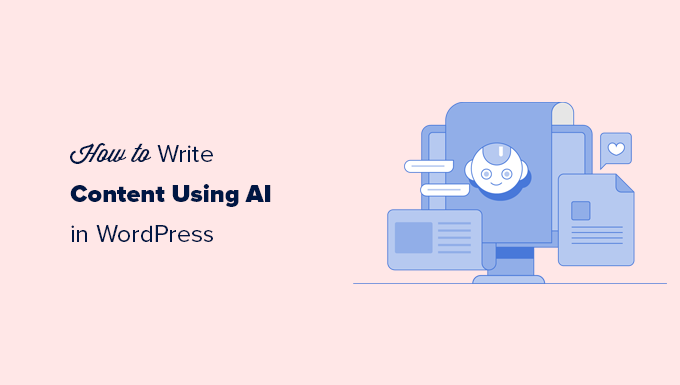
What Are Generative AI Writing Tools?
Generative AI writing tools are like having a supercharged writing assistant. They can generate text, brainstorm ideas, and even mimic writing styles based on the data they’ve learned from millions of sentences.
It’s changing the way content is created, and we’ve seen it firsthand.
Having used many top AI tools, we noticed how much they simplify the content creation process. They’ve helped us speed up tasks like research, drafting posts, and checking style and tone—saving us hours while still keeping quality high.
These tools have been incredibly helpful for brainstorming ideas and even writing complete drafts. If you’ve ever felt stuck or short on time, they can be a game-changer for keeping your blog updated with fresh content.
One of the most popular generative AI tools is ChatGPT. We’ve used it to draft articles, answer complex questions, and even experiment with different writing styles.
Other ChatGPT alternatives like Gemini and Claude AI offer similar capabilities. Each brings unique features tailored to different content needs.
Getting started is easy. Pick your AI tool, give it a topic, and watch as it generates a helpful draft for you. It’s like having a creative partner who never runs out of ideas.
Example 1:
For instance, we asked ChatGPT to write an essay about black holes at a 6th-grade reading level, using simple words and keeping the response between 600 and 800 words.
This is how it responded.
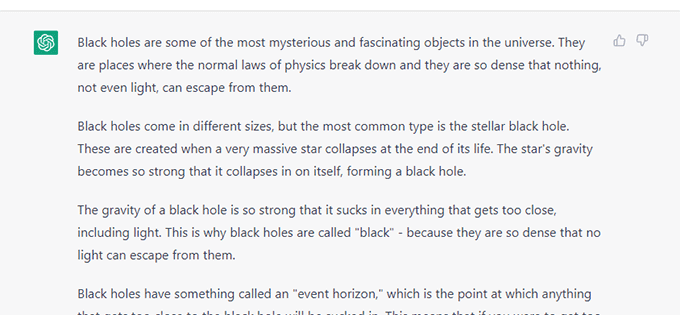
Example 2:
ChatGPT can also write code, poetry, music, explain mathematical equations, and more.
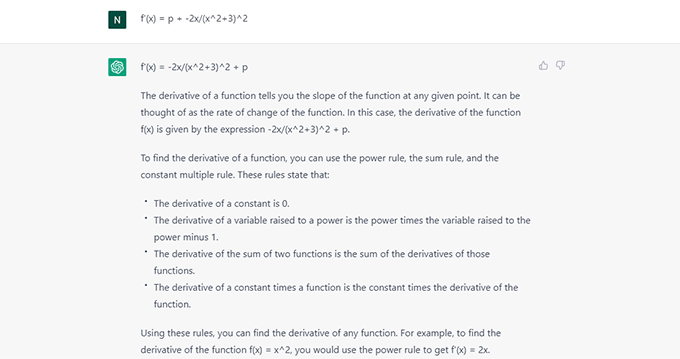
Are AI Writing Tools Good Enough to Write Content?
Many AI tools, including ChatGPT, are good at providing detailed responses that are very well written. This leads many users to believe these tools can be used for content creation on their websites or as an autoblogging tool.
However, before you put these AI writing tools to the test on your actual website, there are a few things that you need to be mindful of.
1. Accuracy of Information
The information provided by ChatGPT could be outdated or sometimes even false. It’s critical that you double-check all the information included in the article.
2. No Recent Events Are Considered
Many AIs have a cut-off date. This date means that AI only had access to data created before that date.
For instance, the knowledge cut-off for GPT-4o models is October 2023.
The information these AIs show could be outdated, so you will need to verify and fact-check it.
3. Doesn’t Give Strong Opinions
AI tools are trained to be impartial and unbiased. Unlike a human writer, they lack the creativity required to argue for a particular opinion, be passionate, and have preferences.
Can AI Writing Tools Be Good for SEO?
Generative AI tools can generate content in a web-friendly format. However, they do not specifically follow any SEO best practices.
Google researchers have worked for years to detect content generated by artificial intelligence tools. In the past, they have penalized it for being low quality.
However, this has changed significantly as AI models got better and the content they are generating now is improved in quality. According to Google Search guidelines:
Appropriate use of AI or automation is not against our guidelines. This means that it is not used to generate content primarily to manipulate search rankings, which is against our spam policies.
We feel that artificial intelligence tools like GPT-4o, Gemeni, and Anthropic’s Claude 3.5 Sonnet can be used as writing assistants rather than full writers.
For instance, they can be used to create an article outline, gather information, and pick some key research points.
After that, a human writer can work on it to make it more comprehensive, opinionated, factual, and SEO-friendly.
For more details, see our article on whether AI content is bad for WordPress SEO and tips on how to create SEO-friendly AI content.
Now, let’s take a look at how to use ChatGPT AI to create content in WordPress.
Using ChatGPT Artificial Intelligence to Write Content in WordPress
First, you need to install and activate the AI Power plugin. For more details, see our step-by-step guide on how to install a WordPress plugin.
Upon activation, you need to visit the AI Power » Settings page to view the plugin settings.
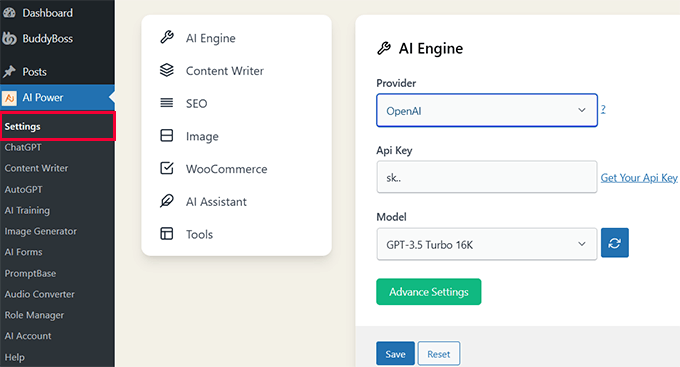
From here, first, you need to choose the AI tool you want to use from the Provider dropdown menu.
After that, you will need to provide the API keys for that tool. For instance, if you selected Open AI (ChatGPT), then click on the ‘Get Your API Key’ link to generate your API key.
Note: Most AI tools have a pay-as-you-go model. You will need to enter your payment details, and you will be charged based on your usage. Please review pricing and set spending limits as needed.
After copying and pasting your API key, don’t forget to click on the ‘Save’ button to store the plugin settings.
Other default options will work for most users, but you can review and change them if needed.
For instance, you can switch to the Content Writer tab and choose a default style, writing tone, and other options.
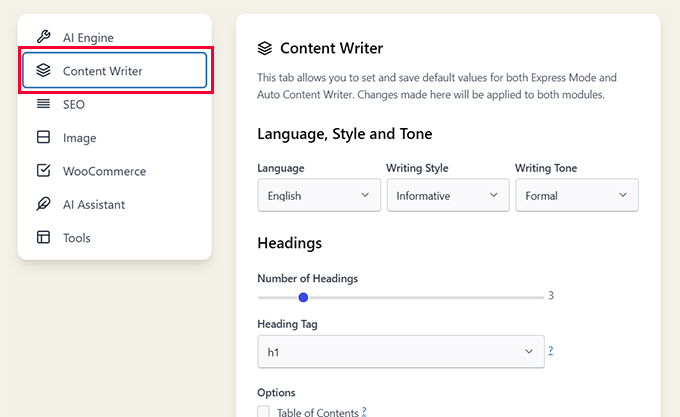
After reviewing the settings, you are ready to start generating AI content.
To write a new blog post, go to Posts » Generate New Post in the WordPress admin area.
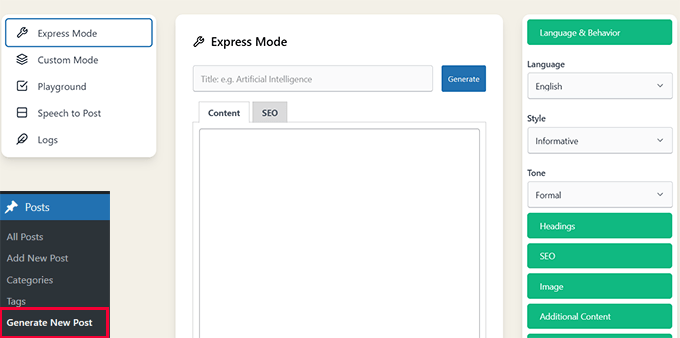
From here, you can provide a title for your article and click ‘Generate’. The plugin will then generate an article using the AI tool you configured earlier.
You can optionally choose a language. The AI writer supports English, Spanish, French, German, Italian, Portuguese, Russian, Japanese, Korean, Chinese, Dutch, Indonesian, Turkish, Polish, Ukrainian, Arabic, Romanian, Greek, Czech, Bulgarian, Swedish, and Hungarian.
You can also generate images with AI by clicking on the Image tab.
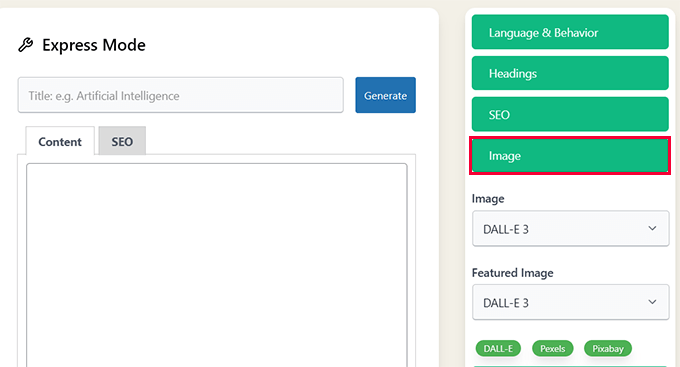
The plugin can generate an image and a featured image matching your article’s topic.
Generate Content With Custom Mode
If you want more granular control over the content generation, then switch to the Custom Mode tab.
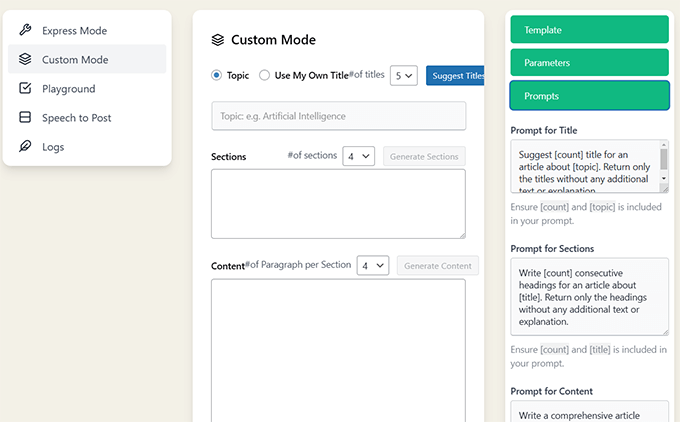
Here, you can switch between AI tools, adjust parameters, switch templates (post types), and customize the prompts used by the plugin to generate content.
Edit Content With Playground Mode
The plugin also offers a playground mode where you can use the older classic editor to edit content and perform AI actions to edit it.
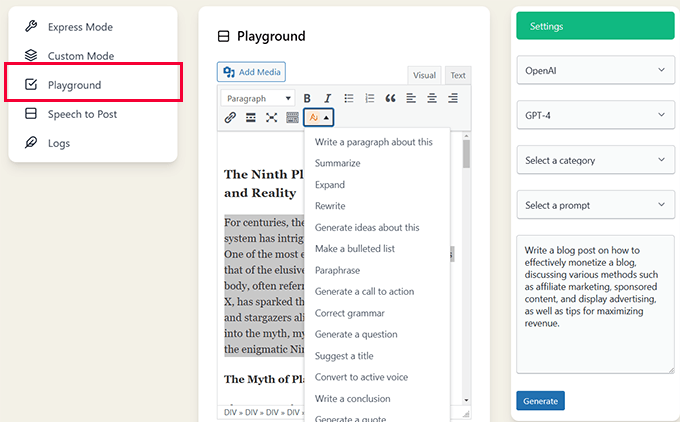
Once you have generated the content, you can copy and paste it as a new post in WordPress.
Related: Learn how to write titles and meta descriptions in WordPress with AI.
Tips on Editing AI-Generated Content
Most AI content generators will write a comprehensive article covering different parts of the topic you have chosen as your article title.
However, it is far from perfect.
We recommend AI content writing tools for research, proofreading, and article outlines.
Once you have an article outline, you can thoroughly review it, fact-check it, add an intro, match your website copy style, and edit it to expand and create original content.
The following are a few things you can do to make the article unique and in your own voice:
1. Check All Information for Accuracy
Depending on your topic, AI algorithms can make mistakes and may sometimes include incorrect information. Fact-check information to ensure high-quality content and don’t entirely rely on AI copywriting.
For eCommerce websites, you will want to check your product descriptions and landing page copy to ensure they are factually correct and do not mislead customers.
2. Create and Use Your Own Images
Some AI content generators can generate images using artificial intelligence. However, for most topics, these images do not look very good.
Here’s an example image that it generated for us.

That’s why you may want to create images for blog posts as you would typically do for any article you write.
3. Add Internal and External Links as Needed
AI tools don’t know which articles on your website are related to the topic, and they cannot automatically generate internal links.
You need to manually add internal and external links to provide more context and make your article more user-friendly. You can make it part of your content creation process to make each of your articles SEO-optimized.
4. Use Table of Contents, FAQs, and Lists
Most AI tools are text generators and do not concern themselves with formatting to improve the reading experience.
You need to manually add any table of contents, lists, and FAQs to make your content more user-friendly.
5. Personalize the Article With Your Expertise & Knowledge
As AI content writing tools become more popular, it will become more critical for authors to add their voice, expertise, and experiences to make an article unique and interesting. This differentiator will play an essential role in determining authentic content vs. not.
Personalizing the article with your experience and making it more coherent is very important in making it more user-focused. For more on this topic, see our explainer on Google E-E-A-T for WordPress websites.
6. Optimize Content for SEO
By default, GPT3 generates easy-to-read text. However, this text is not precisely optimized for on-page SEO. You will also need to do keyword research to include important keywords.
You then need to optimize your content with All in One SEO for WordPress. It is the best WordPress SEO toolkit on the market.
It allows you to easily check your content for SEO, add headlines and meta descriptions using AI, create social media images, and generate schema markup.
For more details, you can see our guide on how to use AI for SEO in WordPress.
FAQs About Using AI Content Writing Tools
1. What are some ChatGPT alternatives?
There are many ChatGPT alternatives available as AI writing tools. Tools like Gemini, Claude AI, and CopyAI are popular among bloggers and content marketing teams. Most of these tools are paid with different pricing options.
For more details, see our expert pick of the best ChatGPT alternatives for bloggers.
2. Can AI content writers pass a plagiarism checker?
These AI apps are trained on publicly available data and use natural language processing to answer users’ input. The content they produce could be similar to that published by other websites, which is why we recommend using them as AI writing assistant tools.
You may also wish to see our pick of the best AI content detectors for writers and website owners.
3. What are some common use cases for ChatGPT?
ChatGPT can be used for copywriting, long-form content, ad copy, marketing copy, social media posts, and landing pages.
AI technology can also be used in the editorial workflow as part of the writing process. It can help with generating content ideas, marketing strategies, product descriptions, social media posts, extending original content, and brainstorming different types of content.
Some users also use AI writing tools to eliminate writer’s block and quickly get started with a workable outline.
Final Thoughts on Using AI Content in WordPress
This is just the beginning, and many other tools will be available on the market in the coming months and years.
If you don’t want to use an AI content plugin for WordPress, you can go directly to the ChatGPT website and write the prompts there to experience the technology for yourself.
We hope this article helped you learn how to write content using AI in WordPress. You may also want to see our pick of the best ChatGPT plugins for WordPress or our guide on how to optimize your WordPress site for Google AI overviews.
If you liked this article, then please subscribe to our YouTube Channel for WordPress video tutorials. You can also find us on Twitter and Facebook.





Jiří Vaněk
Thank you for this guide, it has changed my perspective on working with WordPress and also my efficiency. I use ChatGPT mainly for translations but also for creative content creation. I used to use ChatGPT primarily externally, which is efficient from a content creation standpoint but not in terms of speed. This will make my work much more efficient and faster. Personally, I like AI and I am very happy to integrate it directly into the website and the content creation process.
Mrteesurez
This is an in-depth guide that gave out essential tips to better use AI to generate contents. I used it only as assistant to generate ideas, outline and correct grammatical errors. I agree with you that AI doesn’t has strong opinions for argument, when I give a suggestion it easily accept it as valid without opposing me and also sometimes AI generates false contents that you might think it’s true. The tips you have shared here should be guidelines for beginners on proper use of AI for content generation.
Dennis Muthomi
Well, in my workflow, I rely on ChatGPT (and sometimes Claude) primarily for brainstorming ideas and creating content outline.
I carefully fact check all details and add my own expertise and opinions.
For example, when writing about SEO topics, I add my decade of experience doing technical SEO audits to provide unique insights beyond what ChatGPT can generate.
mohadese esmaeeli
This is a recommendation from me, and everyone is free to use it as they wish; others might have opposing views. In topics where you are an expert or at least have average knowledge, consider using AI for content creation. Use it primarily for bringing up subjects and sections you may have forgotten or never liked. Limit its use to specific sections that you can then rewrite.
WPBeginner Support
We would still strongly suggest only using AI as a writing assistant and not actually for writing content even when used for subjects you know little about.
Admin
Moinuddin Waheed
I used to write and get help for writing content using chatgpt and then paste into Microsoft word to update and rephrase it to suit my needs. it needed a lot of formatting and other things.
having a wordpress plugin to generate content using chatgpt right inside the wordpress editor is very helpful.
is it safe to install in terms of security reasons? because the only fear and concern I do have while installing new plugin is of security vulnerabilities?
WPBeginner Support
Yes, the plugin is safe to install.
Admin
Ahmed Omar
I was using chatGPT to help me writing my content, but now I just found that there is a plugin for chatgpt, which will be more easier and helpful
this a great addition to my knowledge,
thank you
WPBeginner Support
You’re welcome, glad our recommendation was helpful
Admin
Ashikur Rahman
if anyone use ai to create content. Let’s say common topic like movie or tv show review. almost content text are similar. do you think this can penalize a website? or if we just translte in another language whats the possibility of getting bad mark?
WPBeginner Support
As we state in the article, we would recommend using AI as a writing assistant and not directly using content from an AI tool as it would likely be penalized by search engines. Even if you translate the content it will still likely be penalized.
Admin